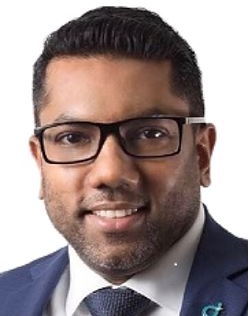According to the Global Business Traveler Report 2020 by Wakefield Research, 51% of respondents anticipate fewer deals due to lack of in-person meetings, while 43% expect declines in new business for the same reason. Nevertheless, 68% of respondents plan on travelling to conferences or events, suggesting a pent-up demand for travel and social interaction as well as ‘pandemic fatigue’, said Mark Wilfred, Head of Solutions Consulting at SAP Concur SEA (pic above).
Wilfred said this during his presentation as part of the DigitalCFO Asia Finance Transformation Webinar Series themed Re-imagining the Future of Corporate Travel held recently.
Wilfred, who also moderated the panel discussion during the online event, further noted that according to the report, 55% and 53% of respondents expressed ‘infecting their families’ and ‘getting sick themselves’ as their top concerns during a business trip respectively.
The other two panellists in the event were Musdalifa Abdullah, Regional CFO of dnata Asia Pacific and Zulaifah Abdul Ghani, Regional CFO of ISS Global Forwarding.

Musdalifa personally felt that while corporate travel was still ongoing on a smaller scale, globally, corporate travel will likely resume between 6 to 12 months, given that vaccination programmes have already started.
According to Zulaifah, since the Finance function is an organisation’s business partner, it should not only be involved in revamping corporate travel policy, it should be actively leading this initiative.
“There are many areas we have to look at – not just travel policy per se, but also in terms of the complexity of the cost elements, and also in terms of compliance, and litigation risks. Comparing pre-pandemic travel policies when revamping them, travel policies focussed on cost containment – choosing between full-fledged carriers and budget carriers, ground transportation etc. or class of travel.
“But now, there are so many other areas we have to look at in terms of the readiness of the destination country we are travelling to, pre-travel vaccinations and insurance. Finance needs to take the lead role, and work closely with senior management and HR to take a look at all these factors as well as the duty of care in terms of when and how we handle matters if someone gets sick during the travel.”
When speaking about how travel insurance should be handled, Zulaifah further added that companies cannot leave it to the employees.

“Previously, travel insurance was straightforward; about lateness, delayed flights, lost baggage – now you’re talking about medical benefits, hospitalisation; the cost is not going to be the same. In the most recent news, the cost of insurance is not going to be fully paid by the underwriters; there may be a co-sharing element, so you may have to pay out-of-pocket. All of this adds to the complexity of insurance coverage.”
Meanwhile, Musdalifa recommended that companies who have not thought about these and other corporate travel issues should do so, as some employees were still very apprehensive about travelling.
“These issues should have been looked at a month ago. Just looking at insurance, COVID-19 has taken a toll not only on developing countries but also on First World nations such as the UK and some EU countries. There is also the possibility of someone being well upon leaving the origin country, but then getting COVID-19 in the destination country and the issues arising from that,” said Musdalifa.
In terms of balancing cost considerations with employee well-being, Musdalifa further emphasised that there was no price to put on employee safety.
“We should start from the very beginning. If vaccination programmes are accessible in your country, and corporate travel is required of your employee, try to get the employee vaccinated before travelling. Definitely, travel cost increases are unavoidable, which is why Finance should be involved right from determining travel policies and whether travel is required from a particular employee in the first place.”

